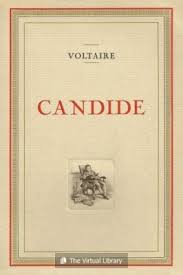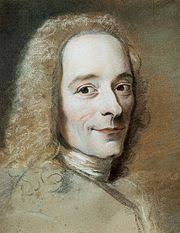Candide Page #14
Candide, ou l'Optimisme, is a French satire first published in 1759 by Voltaire, a philosopher of the Age of Enlightenment.
After rambling about the city the whole afternoon, and seeing but a thousandth part of it, they were reconducted to the royal palace, where Candide sat down to table with his Majesty, his valet Cacambo, and several ladies. Never was there a better entertainment, and never was more wit shown at a table than that which fell from his Majesty. Cacambo explained the King's bon-mots to Candide, and notwithstanding they were translated they still appeared to be bon-mots. Of all the things that surprised Candide this was not the least. They spent a month in this hospitable place. Candide frequently said to Cacambo: "I own, my friend, once more that the castle where I was born is nothing in comparison with this; but, after all, Miss Cunegonde is not here, and you have, without doubt, some mistress in Europe. If we abide here we shall only be upon a footing with the rest, whereas, if we return to our old world, only with twelve sheep laden with the pebbles of El Dorado, we shall be richer than all the kings in Europe. We shall have no more Inquisitors to fear, and we may easily recover Miss Cunegonde." This speech was agreeable to Cacambo; mankind are so fond of roving, of making a figure in their own country, and of boasting of what they have seen in their travels, that the two happy ones resolved to be no longer so, but to ask his Majesty's leave to quit the country. "You are foolish," said the King. "I am sensible that my kingdom is but a small place, but when a person is comfortably settled in any part he should abide there. I have not the right to detain strangers. It is a tyranny which neither our manners nor our laws permit. All men are free. Go when you wish, but the going will be very difficult. It is impossible to ascend that rapid river on which you came as by a miracle, and which runs under vaulted rocks. The mountains which surround my kingdom are ten thousand feet high, and as steep as walls; they are each over ten leagues in breadth, and there is no other way to descend them than by precipices. However, since you absolutely wish to depart, I shall give orders to my engineers to construct a machine that will convey you very safely. When we have conducted you over the mountains no one can accompany you further, for my subjects have made a vow never to quit the kingdom, and they are too wise to break it. Ask me besides anything that you please." "We desire nothing of your Majesty," says Candide, "but a few sheep laden with provisions, pebbles, and the earth of this country." The King laughed. "I cannot conceive," said he, "what pleasure you Europeans find in our yellow clay, but take as much as you like, and great good may it do you." At once he gave directions that his engineers should construct a machine to hoist up these two extraordinary men out of the kingdom. Three thousand good mathematicians went to work; it was ready in fifteen days, and did not cost more than twenty million sterling in the specie of that country. They placed Candide and Cacambo on the machine. There were two great red sheep saddled and bridled to ride upon as soon as they were beyond the mountains, twenty pack-sheep laden with provisions, thirty with presents of the curiosities of the country, and fifty with gold, diamonds, and precious stones. The King embraced the two wanderers very tenderly. Their departure, with the ingenious manner in which they and their sheep were hoisted over the mountains, was a splendid spectacle. The mathematicians took their leave after conveying them to a place of safety, and Candide had no other desire, no other aim, than to present his sheep to Miss Cunegonde. "Now," said he, "we are able to pay the Governor of Buenos Ayres if Miss Cunegonde can be ransomed. Let us journey towards Cayenne. Let us embark, and we will afterwards see what kingdom we shall be able to purchase." XIX WHAT HAPPENED TO THEM AT SURINAM AND HOW CANDIDE GOT ACQUAINTED WITH MARTIN. Our travellers spent the first day very agreeably. They were delighted with possessing more treasure than all Asia, Europe, and Africa could scrape together. Candide, in his raptures, cut Cunegonde's name on the trees. The second day two of their sheep plunged into a morass, where they and their burdens were lost; two more died of fatigue a few days after; seven or eight perished with hunger in a desert; and others subsequently fell down precipices. At length, after travelling a hundred days, only two sheep remained. Said Candide to Cacambo: "My friend, you see how perishable are the riches of this world; there is nothing solid but virtue, and the happiness of seeing Cunegonde once more." "I grant all you say," said Cacambo, "but we have still two sheep remaining, with more treasure than the King of Spain will ever have; and I see a town which I take to be Surinam, belonging to the Dutch. We are at the end of all our troubles, and at the beginning of happiness." As they drew near the town, they saw a negro stretched upon the ground, with only one moiety of his clothes, that is, of his blue linen drawers; the poor man had lost his left leg and his right hand. "Good God!" said Candide in Dutch, "what art thou doing there, friend, in that shocking condition?" "I am waiting for my master, Mynheer Vanderdendur, the famous merchant," answered the negro. "Was it Mynheer Vanderdendur," said Candide, "that treated thee thus?" "Yes, sir," said the negro, "it is the custom. They give us a pair of linen drawers for our whole garment twice a year. When we work at the sugar-canes, and the mill snatches hold of a finger, they cut off the hand; and when we attempt to run away, they cut off the leg; both cases have happened to me. This is the price at which you eat sugar in Europe. Yet when my mother sold me for ten patagons[20] on the coast of Guinea, she said to me: 'My dear child, bless our fetiches, adore them for ever; they will make thee live happily; thou hast the honour of being the slave of our lords, the whites, which is making the fortune of thy father and mother.' Alas! I know not whether I have made their fortunes; this I know, that they have not made mine. Dogs, monkeys, and parrots are a thousand times less wretched than I. The Dutch fetiches, who have converted me, declare every Sunday that we are all of us children of Adam--blacks as well as whites. I am not a genealogist, but if these preachers tell truth, we are all second cousins. Now, you must agree, that it is impossible to treat one's relations in a more barbarous manner."
Translation
Translate and read this book in other languages:
Select another language:
- - Select -
- 简体中文 (Chinese - Simplified)
- 繁體中文 (Chinese - Traditional)
- Español (Spanish)
- Esperanto (Esperanto)
- 日本語 (Japanese)
- Português (Portuguese)
- Deutsch (German)
- العربية (Arabic)
- Français (French)
- Русский (Russian)
- ಕನ್ನಡ (Kannada)
- 한국어 (Korean)
- עברית (Hebrew)
- Gaeilge (Irish)
- Українська (Ukrainian)
- اردو (Urdu)
- Magyar (Hungarian)
- मानक हिन्दी (Hindi)
- Indonesia (Indonesian)
- Italiano (Italian)
- தமிழ் (Tamil)
- Türkçe (Turkish)
- తెలుగు (Telugu)
- ภาษาไทย (Thai)
- Tiếng Việt (Vietnamese)
- Čeština (Czech)
- Polski (Polish)
- Bahasa Indonesia (Indonesian)
- Românește (Romanian)
- Nederlands (Dutch)
- Ελληνικά (Greek)
- Latinum (Latin)
- Svenska (Swedish)
- Dansk (Danish)
- Suomi (Finnish)
- فارسی (Persian)
- ייִדיש (Yiddish)
- հայերեն (Armenian)
- Norsk (Norwegian)
- English (English)
Citation
Use the citation below to add this book to your bibliography:
Style:MLAChicagoAPA
"Candide Books." Literature.com. STANDS4 LLC, 2025. Web. 22 Jan. 2025. <https://www.literature.com/book/candide_25>.




Discuss this Candide book with the community:
Report Comment
We're doing our best to make sure our content is useful, accurate and safe.
If by any chance you spot an inappropriate comment while navigating through our website please use this form to let us know, and we'll take care of it shortly.
Attachment
You need to be logged in to favorite.
Log In